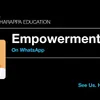90 percent of women hesitate to ask for a raise at work, reveals Harappa Education Survey
Harappa Education conducted an extensive survey to understand the prejudices and differentiated behaviour towards women professionals and to incorporate their unique perspectives within curriculums designed to help empower women leaders and leaders-in-making.
Harappa Education, a learner-based future-centric institution, recently released a report on what women in leadership need.
The institution conducted an extensive survey to understand the prejudices and differentiated behaviour towards women professionals and to incorporate their unique perspectives within curriculums designed to help empower women leaders and leaders-in-making.
It released its findings on May 1, International Labour Day, to commemorate the labour movement. While new reforms may have swept the role of women in the workplace, the survey is also aimed at looking at the gaps in our workplaces from a gender lens.

Conducted among 500 respondents, it revealed that while 99 percent of women believe it to be important for women professionals to build networks and alliances, only 47 percent of women actively pursue opportunities for their professional growth and learning.
What's more, across the survey sample set, a staggering 90 percent of female respondents stated that they hesitate to ask for a raise at work.
The survey also uncovered some interesting insights regarding skills that women professionals perceive to be most important in their professional journeys. According to the data collected, close to 72 percent of women consider communication to be the top skill that continues to help them in their professional journey, followed by confidence (65 percent) and self-awareness (41 percent).
Shreyasi Singh, Founder & CEO, Harappa Education, said, “I’ve always felt committed to learning and development and a determination to leave the world of work for women, a little better than I found it. I’m delighted about all our seven new programme offerings at Harappa, but especially the Women’s Leadership Program — designed to enhance the learning journey of high potential women managers, based on our distinctive 10 on 10 pedagogy. The ‘What Women in Leadership Need’ survey research allows us to better understand the challenges women professionals face and co-build our Women’s Leadership Program, capturing what matters the most to current and aspiring women leaders.”
There are other sides to the survey that revealed 85 percent of the women professionals feel that at least once in their career, they have been perceived as ‘bossy’ or ‘dominating’ when they were just being assertive.

Also, 97 percent of the women consider it to be important for women professionals to cultivate a personal brand for themselves, while close to 74 percent of the women affirm calling themselves a perfectionist.
From women professionals with less than 20 years of work experience, 52 percent stated that they feel inadequate or underqualified for their positions, despite their multiple years of experience. This figure displayed a gradual decrease for women with more than 20 years of corporate experience (37 percent). Surprisingly, a mere 21 percent of women felt continuously supported by their male peers at workplaces.
The outlook for women at workplaces looks bright however as 87 percent of women respondents believe that the future for women in leadership looks promising in the coming three years.
Harappa Education’s Women’s Leadership Program comprises 15 must-have essential Thrive Skills - an essential set of cognitive, social, and behavioral skills — for women leaders. The survey findings echo these 15 skills: Supporting & Empowering Other Women, Questioning Limiting Beliefs, Being Resilient, Communicating with Power, Increasing Self Awareness, Cultivating a Personal Brand, Having The Courage to be Vulnerable, Overcoming Perfectionism, Tackling Imposter Syndrome, Balancing Passion w/ Persistence, Building Alliances & Networks, Asking For Money, Moving from judgemental to neutral language, Being Confident & Authentic, and Trusting One’s Voice.
Edited by Megha Reddy








